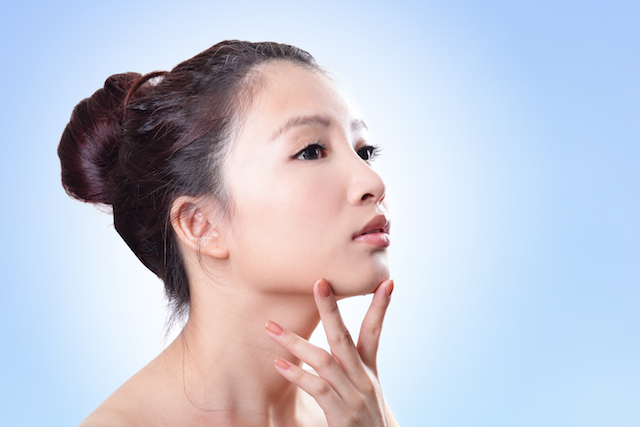
Young woman looking at skin photo via Shutterstock
By Margaret Barthel
Personally, I’ve never been much of a make-up girl. I’ve enjoyed putting the occasional dash of eyeshadow or swipe of lip gloss on to make things feel just that much more festive, but it’s only been since I started a full time job a few months ago that I’ve been wearing cosmetics regularly.
My mother is deeply skeptical of mainstream beauty products, and cautioned me that I should make sure that whatever I put on my face every day is appropriately benign. And as much eye-rolling as I do, she’s right: it’s silly to not do the informed-consumer thing and dig up the information necessary to making smart decisions about products that I’m putting on my body day in and day out.
My very first Google search on the subject of safe makeup brands yielded the following depressing, frustrating, but not-so-shocking results. For starters, the Food and Drug Administration has no power to test cosmetic products for safety before they arrive in your local Sephora or CVS–the only exception to this being non-hair dye color additives (so, rest assured, your hair dye has all kinds of exciting, unpronounceable ingredients in it still). All the FDA can do is check out manufacturing facilities for malpractice, perform independent research on various products and inform consumers of the findings, and “encourage” companies to participate in the Voluntary Cosmetic Registration Program, in which they self-report safety data and ingredient lists.
Are cosmetic companies likely to do this? Some are; and it seems as if the majority aren’t. This is an industry that has gotten increasingly crafty in its strategies for getting consumers to buy products that can be downright dangerous. “Greenwashing,” for instance, is the practice of packaging something as “natural” and “organic”–words which have no regulated meaning when it comes to cosmetics, unless the bottle has a USDA-certified organic label on it–by way of lulling unwitting consumers into thinking the product is not hazardous. Worse, there’s “pinkwashing,” an even more cynical business practice in which companies market cosmetics as part of their commitment to fight breast cancer, even though their products have known carcinogenic elements and might actually be contributing to rising breast cancer rates.
So now that you’re feeling suitably jaded, some good news: several organizations and publications offer common-sense advice for seeing past the scurrilous marketing and making good cosmetic choices. The Campaign for Safe Cosmetics, which advocates for stricter regulation of the beauty industry, has a Compact for Safe Cosmetics that it invites companies to sign to show their commitment to sell products that are safe for women’s health. If you don’t see a company on the list, it’s potentially pretty damning: as they say on the frequently asked questions page, “If they [cosmetic companies] are truly supporting women’s health and making “safe” products, it shouldn’t be too hard for them to sign the Compact.”
While the Campaign for Safe Cosmetics works to install common-sense regulatory procedures, consumers must take the initiative for their own health and safety. There are useful tools available here too: the Environmental Working Group, for example, has compiled the Skin Deep Cosmetics Database, which rates hair, skin, and makeup products on a scale of 1-10, ten being most hazardous to your health. Other common sense guidelines include looking for shorter lists of ingredients that don’t look like alphabet soup, paying particular attention to the presence of the Dirty Dozen (more here) and “fragrance,” which can be any combination of secret ingredients.
Does all this rule out most of the beauty isle? It doesn’t have to–it just adds another, more responsible dimension to your cosmetic decisions and a heavy dose of cynicism to your life. Although I’m pleased to report that some of the products I’ve been using past muster, according to the Skin Deep database, but not enough to keep me eye-rolling my way to a safer makeup bag in short order.
 About the Writer
About the Writer
Margaret Barthel recently graduated from Smith College with a degree in English Language and Literature. Among other things, she’s a writer, reader, history buff, and outdoors enthusiast with deep interests in feminism, politics, and the environment. A semester abroad studying at Oxford University and exploring continental Europe, in addition to plenty of quirky family vacations, are to blame for her love of travel. Find more of her work at margaretbarthel.wordpress.com.


